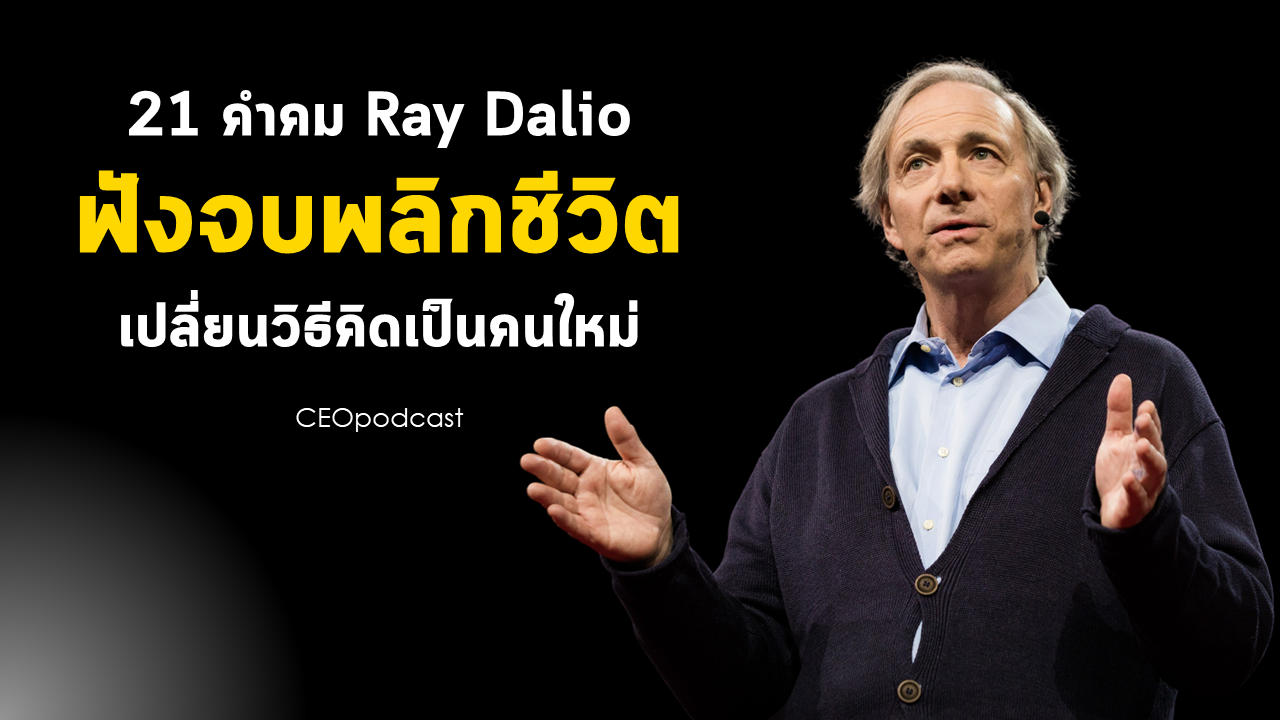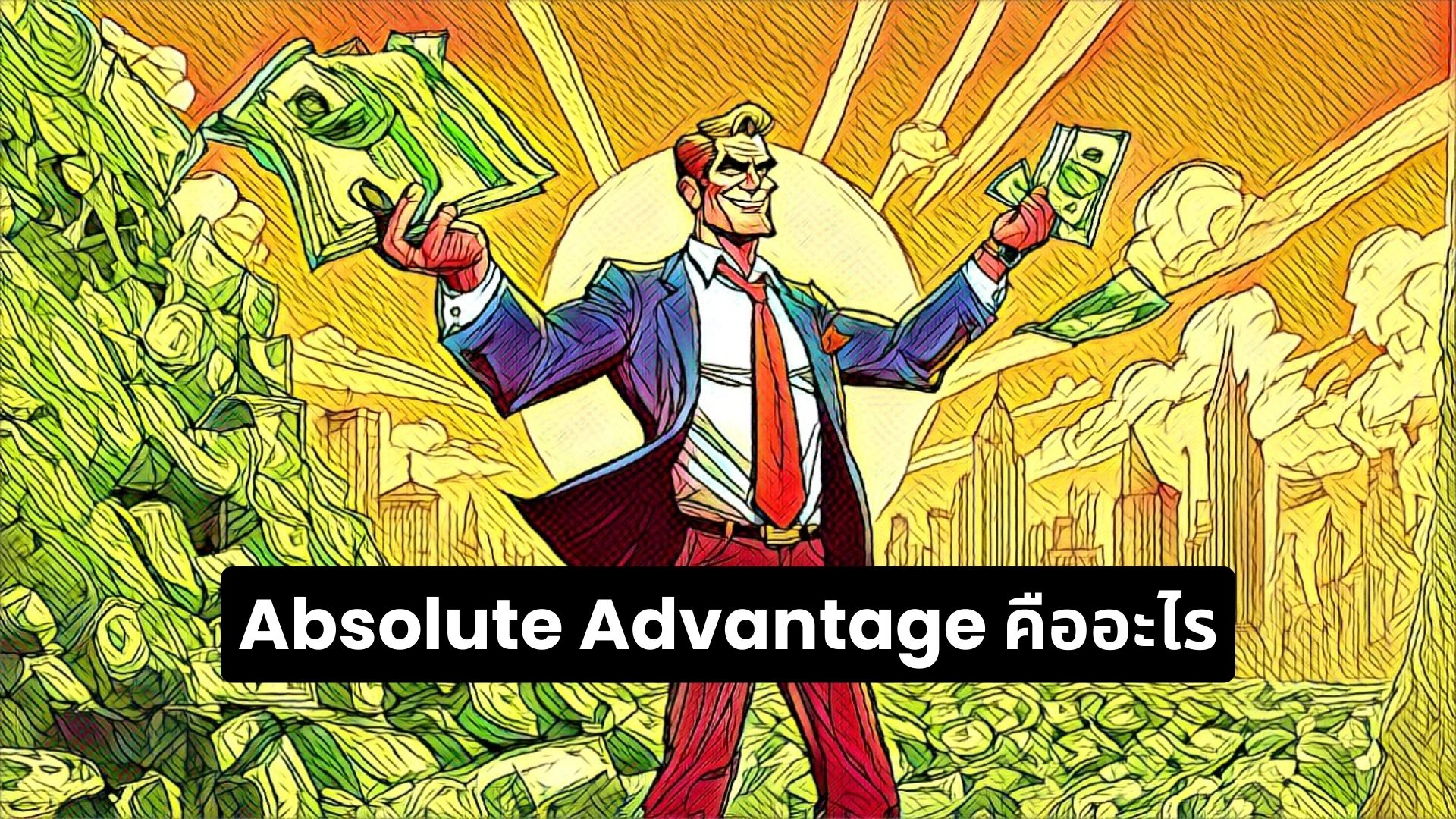21 คำคมและแง่คิดที่กลั่นมาจากประสบการณ์ชีวิตของ คุณ Ray Dalio นักลงทุนชื่อดังเจ้าของกิจการกองทุน Bridgewater Associates เจ้าของหนังสือ Best Seller – Principles และเขายังเป็นเศรษฐีอันดับที่ 100 ของโลกพอดิบพอดี ณ ต้นเดือน กรกฏาคม ปี 2022 ทั้ง 21 ข้อนี้ ชี้ให้เห็นว่าคนประสบความสำเร็จก็ต้องเคยผ่านช่วงเวลาที่ยากลำบากและเจ็บปวดมาแล้วเช่นกัน และเขาตกผลึกมาเป็นวิธีคิดอะไรนำมากลับมาสอนพวกเราในวันนี้
ข้อ 1 “Beware of statements that begin with “I think that …Just because someone thinks something doesn’t mean it’s true.”
เมื่อคุณมีความฝันบางอย่าง หรือมีอุปสรรคบางประการที่กำลังต้องการคำแนะนำจากผู้อื่น จงระวังประโยคเปิดหัวคำแนะนำว่า ‘ฉันคิดว่า’ เพราะคำว่า ‘คิดว่า’ ไม่ได้แปลว่ามันจะเป็นความจริงที่เชื่อถือได้ เพราะความคิด ก็ดี และ ความเชื่อ ก็ดี ทั้งสองนี้ไม่ได้มีรากฐานมาจาก ‘ความรู้’ พวกเขาอาจพูดออกมาจากมุมมองส่วนตัว ที่อาจยังไม่มีการพิสูจน์ข้อเท็จจริง
ข้อ 2 “Listening to uninformed people is worse than having no answers at all.”
การฟังคำตอบจากคนไม่มีความรู้จริงในเรื่องที่ถามนั้น เลวร้ายยิ่งกว่าการไม่ถามไม่ตอบอะไรเลย
ข้อ 3 “Find the most believable people possible who disagree with you …and try to understand their reasoning. Having open-minded conversations with believable people who disagree with you is the quickest way to get an education and to increase your probability of being right.”
จงเสาะหาบุคคลที่มีความรู้เชื่อถือได้ ที่พร้อมจะเห็นต่างจากคุณ เพื่อทำความเข้าใจความคิดเห็นในมุมต่างของเขาที่มีต่อแผนงานของคุณ นี่คือวิธีเรียนรู้และเพิ่มโอกาสที่คุณจะทำตามแผนอย่างถูกต้องได้ดีที่สุด
ข้อ 4 “Look for people who have lots of great questions …Smart people are the ones who ask the most thoughtful questions, as opposed to thinking they have all the answers. Great questions are a much better indicator of future success than great answers.”
ถ้าจะให้ดี ผู้ให้คำแนะนำควรเป็นนักถามที่ชาญฉลาด เพื่อที่เขาจะได้ทวนถามถึงสิ่งที่คุณกำลังจะทำ เพื่อให้เกิดกระบวนการเรียนรู้ ฉุกคิด และนำไปสู่คำตอบภายในใจของคุณเอง บางครั้ง คำตอบสุดท้ายของคุณ อาจมาจากคำถามที่ชาญฉลาดของอีกฝ่าย
ข้อ 5 “I learned that if you work hard and creatively …you can have just about anything you want, but not everything you want. Maturity is the ability to reject good alternatives in order to pursue even better ones.”
ถ้าคุณทำงานหนักอย่างสร้างสรรค์ คุณจะสามารถสมปรารถนาได้เกือบทุกอย่างที่ใฝ่ฝัน แต่เพราะเราไม่สามารถเป็นเจ้าของทุกอย่างบนโลกได้ คุณจึงต้องเป็นผู้ฉลาดเลือก เป็นผู้รู้จักอดเปรี้ยวไว้กินหวาน รอสิ่งที่ดีกว่าเพราะคุณรู้ชัดแล้วว่าทำได้แน่ ๆ
ข้อ 6 “If you’re not failing, you’re not pushing your limit … and if you’re not pushing your limits, you’re not maximizing your potential.”
ถ้าคุณไม่เคยมีโอกาสล้มเหลว คุณก็จะไม่เคยมีโอกาสผลักดันศักยภาพของตนเอง และหากคุณไม่มีโอกาสผลักดันศักยภาพของตนเอง เท่ากับคุณจะไม่ได้ใช้พลังในตัวคุณอย่างสูงสุด
ข้อ 7 “I saw that to do exceptionally well you have to push your limits and that, if you push your limits, you will crash and it will hurt a lot. You will think you have failed—but that won’t be true unless you give up.”
การที่คุณจะประสบความสำเร็จได้ คุณต้องผลักดันตัวเองให้มากกว่าขีดจำกัดเดิม ซึ่งแน่นอนว่าคุณมีโอกาสล้ม และเจ็บปวด เมื่อถึงเวลานั้น คุณอาจคิดว่าคุณล้มเหลว แต่ข้อเท็จจริง คือ ความล้มเหลวจะเกิดขึ้นต่อเมื่อคุณยอมแพ้
ข้อ 8 “Every time you confront something painful, you are at a potentially important juncture in your life—you have the opportunity to choose healthy and painful truth or unhealthy but comfortable delusion.”
ทุกครั้งที่คุณต้องเผชิญหน้ากับความเจ็บปวด ให้รู้ไว้ว่าคุณกำลังมาถึงทางแยกที่ต้องเลือกระหว่าง ความกล้าหาญที่จะเลือก เผชิญความจริงที่เจ็บแต่จบ หรือ ฟังเรื่องโกหกเพื่อหลอกตัวเองไปวัน ๆ
ข้อ 9 “Nature gave us pain as a messaging device to tell us that we are approaching, or that we have exceeded, our limits in some way.” ประสบการณ์ที่เจ็บปวด เปรียบเสมือนสัญญาณบอกว่าคุณกำลังเข้าใกล้ หรือทะลุขีดจำกัดเดิมของคุณไปแล้ว
ข้อ 10 “The pain of problems is a call to find solutions …rather than a reason for unhappiness and inaction, so it’s silly, pointless, and harmful to be upset at the problems and choices that come at you (though it’s understandable).”
ความรู้สึกเจ็บปวดต่อปัญหาที่เข้ามา เป็นเครื่องกระตุ้นเตือนว่าคุณต้องเร่งหาเหตุผลและทางออกให้เร็วที่สุด หาใช่พร่ำบ่นว่าทำไมมันต้องเกิดกับคุณ หรือเอาแต่กล่าวโทษสิ่งรอบตัว
ข้อ 11 “Imagine that in order to have a great life you have to cross a dangerous jungle. You can stay safe where you are and have an ordinary life, or you can risk crossing the jungle to have a terrific life. How would you approach that choice? Take a moment to think about it because it is the sort of choice that, in one form or another, we all have to make.”
ให้จินตนาการตัวเองมองเข้าไปยังป่ารกชัฏที่น่ากลัว โดยรู้ว่ามีดินแดนเขียวชอุ่มรออยู่ ณ ปลายทาง คุณมีทางเลือกที่จะไปหรือไม่ไปก็ได้ ถ้าไม่ไปก็นอนตีพุงสบาย ๆ อยู่ที่เดิม แต่ถ้าก้าวเข้าไป คุณอาจจะต้องเผชิญอันตรายมากมายคาดเดาได้ยาก เพื่อแลกกับโอกาสมีชีวิตใหม่ที่ยอดเยี่ยม ณ ปลายทาง ชีวิตคนเราต้องตัดสินใจเลือกเสมอ และคุณคือผู้รับผลในสิ่งที่เลือก
ข้อ 12 “To be effective you must not let your need to be right be more important than your need to find out what’s true. If you are too proud of what you know or of how good you are at something you will learn less, make inferior decisions, and fall short of your potential.”
ข้อเท็จจริงตามความเป็นจริง สำคัญกว่า ความยึดติดความคิดว่า ฉันถูกเธอผิด …ความภูมิใจในความคิดว่าตัวเองถูกแล้ว รู้แล้ว หรือเก่งแล้ว จะทำให้คุณเรียนรู้สิ่งใหม่ ๆ น้อยลง ส่งผลต่อการตัดสินใจผิดพลาดมากขึ้นในอนาคต และท้ายที่สุด ชีวิตคุณจะถอยหลังลงคลอง
ข้อ 13 “Remember that most people are happiest when they are improving and doing the things that suit them naturally and help them advance. So learning about your people’s weaknesses is just as valuable (for them and for you) as is learning their strengths.”
จงจำไว้เสมอว่า มนุษย์มีความสุขเมื่อพวกเขาได้พัฒนาตัวเอง และได้ทำสิ่งที่เหมาะสมกับศักยภาพที่แท้จริงของพวกเขา ดังนั้น การศึกษาจุดแข็ง และจุดอ่อนของตนเองและเพื่อนร่วมงานเป็นสิ่งที่ควรเรียนรู้และทำความเข้าใจ
ข้อ 14 “Thoughtful disagreement is not a battle …its goal is not to convince the other party that he or she is wrong and you are right, but to find out what is true and what to do about it.”
ความเห็นต่างอย่างมีเหตุผลไม่ใช่การชวนทำสงคราม และเป้าหมายในการเห็นต่างไม่ใช่การชี้วันฉันถูกคุณผิด แต่เป็นการร่วมกันค้นหา ข้อเท็จจริงตามความเป็นจริง
ข้อ 15 “When a problem occurs, conduct the discussion at two levels: 1) the machine level (why that outcome was produced) and 2) the case-at-hand level (what to do about it).”
เมื่อคุณประสบปัญหาชีวิต ให้ใช้หลักคิด 2 มิติ มิติที่ 1) หลักที่มาที่ไป ว่ามันเกิดขึ้นได้อย่างไร อะไรเป็นต้นเหตุของผล และ มิติที่ 2) หลักปฏิบัติ คือ กระบวนการลงมือทำเพื่อแก้ปัญหา
ข้อ 16 “While I used to get angry and frustrated at people because of the choices they made, I came to realize that they weren’t intentionally acting in a way that seemed counterproductive; they were just living out things as they saw them, based on how their brains worked.”
Ray Dalio บอกว่าเขาก็อารมณ์เสียเป็นเมื่อคนทำงานไม่ได้ดั่งใจ แต่มักสืบทราบภายหลังว่าพวกเขาไม่ได้จงใจที่จะทำให้เขาอารมณ์เสีย อุปมากับพวกเราทุกคนต่างสวมแว่นตาคนละอัน มองโลกคนละมุม และเขาแค่ตอบสนองไปตามมุมมองที่เขาคิดว่ามันใช่ สมองของพวกเขาแค่สั่งการแบบนั้น
ข้อ 17 “Remember that the only purpose of money is to get you what you want, so think hard about what you value and put it above money. How much would you sell a good relationship for? There’s not enough money in the world to get you to part with a valued relationship.”
จงจำไว้เสมอว่า เงิน ช่วยให้คุณได้วัตถุปัจจัยภายนอกต่าง ๆ ที่คุณต้องการ แต่ความสัมพันธ์ที่ยอดเยี่ยมกับผู้คนดี ๆ ไม่อาจซื้อได้ด้วยเงิน จงรักษาความสัมพันธ์ที่ยอดเยี่ยมไว้ไม่ว่าคุณจะร่ำรวยแค่ไหนก็ตาม
ข้อ 18 “It’s senseless to have making money as your goal as money has no intrinsic value—its value comes from what it can buy, and it can’t buy everything. It’s smarter to start with what you really want, which are your real goals, and then work back to what you need to attain them. Money will be one of the things you need, but it’s not the only one and certainly not the most important one once you get past having the amount you need to get what you really want.”
Ray Dalio บอกว่า การตั้งเป้าหมายด้วยเงินเป็นเรื่องไร้สาระ ทำไม่อย่างนั้นล่ะ? เขาบอกเงินไม่ได้มีคุณค่าแท้จริง คุณค่าอยู่ในสินทรัพย์ โดยเงินเป็นสื่อกลางที่ใช้แลกกลับมาเป็นสินทรัพย์ที่คุณอยากได้ ณ ปลายทางของเป้าหมาย
ดังนั้น จงตั้งเป้าหมายปลายทางว่าคุณอยากได้อะไร แล้วเวิร์คแบ็กว่าคุณต้องทำอะไรจึงจะได้มา แล้วจะเห็นภาพชัดขึ้นว่าเงินเป็นแค่สื่อกลางเท่านั้น และคุณจะยิ่งเข้าใจมากขึ้นในวันที่คุณมีเงินมากในระดับหนึ่งแล้ว
สรุปทวนสั้น ๆ อีกครั้ง จงตั้งเป้าหมายไปเลยว่าคุณอยากได้อยากมี หรืออยากเป็นอะไรไปเลย เดี๋ยวเงินมันจะแทรกเข้ามาในกระบวนการนั้นโดยอัตโนมัติ
ข้อ 19 “Meditate. I practice Transcendental Meditation and believe that it has enhanced my open-mindedness, higher-level perspective, equanimity, and creativity. It helps slow things down so that I can act calmly even in the face of chaos, just like a ninja in a street fight. I’m not saying that you have to meditate in order to develop this perspective; I’m just passing along that it has helped me and many other people and I recommend that you seriously consider exploring it.”
หมั่นหาโอกาสนั่งสมาธิ -Ray Dalio บอกว่าผลจากการนั่งสมาธิ ช่วยให้เขามีกำลังสติดีขึ้น มีวิสัยทัศน์เปิดกว้างขึ้น มีความคิดสร้างสรรค์สูงขึ้น ในขณะเดียวกัน ก็ปล่อยวางเรื่องเครียด ๆ ได้เร็วขึ้น การฝึกสมาธิช่วยให้โลกดูหมุนช้าลงในวันที่เผชิญปัญหา และทำให้เขาแก้ปัญหาอย่างมีสติสุด ๆ
ข้อ 20 “Truth – more precisely, an accurate understanding of reality – is the essential foundation for producing good outcomes.”
คำว่า Truth ที่แปลว่าความจริง ในความหมายที่ Ray Dalio พยายามจะสื่อ คือ ความเข้าใจธรรมชาติตามความเป็นจริงอย่างจริงแท้ถึงแก่น เข้าใจบนพื้นฐานของข้อเท็จจริง ข้อมูล และหลักเหตุผลล้วน ๆ โดยไม่อิงอารมณ์ความรู้สึก หรืออิงความคิดแบบ ‘ฉันคิดว่า’ – Ray Dalio บอกว่ามันเป็นหัวใจสำคัญในการสร้างผลลัพธ์ในชีวิตของคุณ
และสุดท้าย ข้อ 21 “Having nothing to hide relieves stress and builds trust.” การเป็นผู้ไม่ต้องคอยมีลับลมคมในต้องปิดบัง ช่วยให้จิตใจปลอดโปร่ง และมันทำให้คุณเป็นคนน่าเชื่อถือโดยไม่ต้องพยายาม
และนี่คือ 21 คำคมและวิธีคิดดี ๆ จากคุณ Ray Dalio ผู้เขียนหนังสือ Principles ที่คุณสามารถนำไปปรับใช้กับชีวิตได้ทันที
คุณอาจสนใจ
6 วิธีเอาชนะความกลัว ในการเริ่มต้นทำสิ่งใหม่ ๆ ในชีวิต
ที่มา : Goodreads







